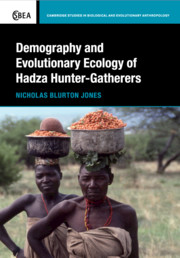Book contents
- Frontmatter
- Contents
- Preface and acknowledgments
- Part I Demography
- Part II Applying the demographic data to interpreting Hadza behavior and biology
- 12 Introduction
- 13 The outcome variables: fertility, child survival, and reproductive success
- 14 Men's and women's reputations as hunters, traders, arrow makers, and diggers
- 15 Marriage
- 16 Another dependent variable: growth as a proxy for fitness
- 17 Inter-birth intervals: a trade-off between fertility and offspring survival?
- 18 Grandmothers as helpers
- 19 Grandmothers and competition between the generations
- 20 Children as helpers
- 21 Husbands and fathers as helpers
- 22 Variation among hunter-gatherers: evolutionary economics of monogamy, male competition, and the sharing ethic
- References
- Index
15 - Marriage
from Part II - Applying the demographic data to interpreting Hadza behavior and biology
Published online by Cambridge University Press: 05 January 2016
- Frontmatter
- Contents
- Preface and acknowledgments
- Part I Demography
- Part II Applying the demographic data to interpreting Hadza behavior and biology
- 12 Introduction
- 13 The outcome variables: fertility, child survival, and reproductive success
- 14 Men's and women's reputations as hunters, traders, arrow makers, and diggers
- 15 Marriage
- 16 Another dependent variable: growth as a proxy for fitness
- 17 Inter-birth intervals: a trade-off between fertility and offspring survival?
- 18 Grandmothers as helpers
- 19 Grandmothers and competition between the generations
- 20 Children as helpers
- 21 Husbands and fathers as helpers
- 22 Variation among hunter-gatherers: evolutionary economics of monogamy, male competition, and the sharing ethic
- References
- Index
Summary
“Haine (the sun) was married to Seta (the moon). One day they argued and Haine sent Seta away. Later on they missed each other and have been trying to get together again. When it rains in the evening, you are seeing the tears of Seta trying to catch up with Haine. When it rains in the morning, these are the tears of Haine trying to catch up with Seta.”
The tragic romance of this many-versioned Hadza story is a stark contrast to our early field experiences. Soon after we began our behavioral and ecological observations, staying in a camp and observing people's daily activities, we began to wonder why Hadza women kept husbands. Women toiled in the hot sun all day digging tubers, then came home and hammered baobab seeds until dark, while men sat in the shade talking, smoking, and fiddling with their arrows (Photograph 14.3). At about four o'clock, soon after the women had returned to camp, men would walk to their house, take a handful of tubers and march quickly back to the men's assembly place to eat the tubers. Seldom did men, avidly professed hunters, materialize with meat. Why did the women put up with this? Occasionally a man would arrive with a small bag of honey, or a game bird, or even a bundle of baobab pods and leave them at his wife's house for her to do the lengthy processing. Only rarely, a man would arrive in camp with meat over his shoulder, park it on the roof of his house, report that people could carry more meat if they cared to go and get it, and then retire to the men's place to smoke. Men, women, and children would rush off into the bush and come back an hour or so later, laden with meat. Every house, even the house of a single old woman, ended up with some meat. If waiting around for a hunter to succeed was a reason to keep a husband, then why not just wait around for someone else's kept man to announce a kill?
We still puzzle about this, and dispute with friends and colleagues over the fitness economics of hunting (Wood and Marlowe, 2013, 2014; Hawkes et al., 2014).
- Type
- Chapter
- Information
- Demography and Evolutionary Ecology of Hadza Hunter-Gatherers , pp. 282 - 310Publisher: Cambridge University PressPrint publication year: 2016



